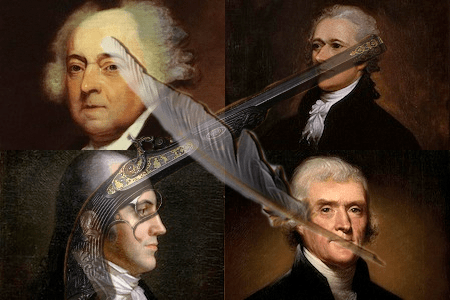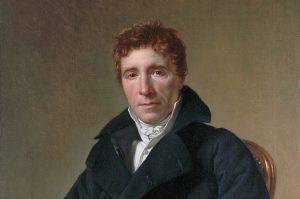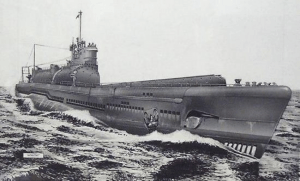After watching the current events of this 2016 election, the American people can agree as a whole that this Presidential race has been significantly different than ones we have seen before. The two candidates take and give personal blows to each other, and the electorate watches as what seems as the most personal election in recent history. With careful consideration of previous American Presidential Elections, one might be reminded of another election just as personal, maybe even more so, than our current one. The Election of 1800, or as Thomas Jefferson put it: the “Revolution of 1800.”1
This gruesome election was between Federalist and incumbent John Adams with his running mate Charles C. Pinckney and Democratic-Republican and principal author of the Declaration of Independence Thomas Jefferson with his running mate Aaron Burr. In this story we have an interesting cast of characters, all of which are very prominent figures in the history of the early Republic. The men involved had intricate personal relationships that acted as a catalyst in the crucible that would become the Election of 1800.
All men involved came from some form of political or military merit. John Adams was a prominent voice in declaring America’s Independence. Thomas Jefferson had been the United States Minister to France (he had spent a majority of the war and its aftermath in France). Aaron Burr had been a colonel in the Continental Army. Most of the men were quite fond of each other due to the fact that they had worked with each other before, although all had one thing in common: their distaste for Alexander Hamilton, Chief de Aide for General George Washington during the Revolutionary War and Senior Officer in the Continental Army. Hamilton was a stubborn man. Years before the election Hamilton had attempted to destroy Adams in his Adams’ Pamphlet, 2. He continuously bashed heads with Jefferson, while both he and Jefferson served in George Washington’s Presidential Cabinet in the early 1790s; and Hamilton was very vocal in his distaste of Aaron Burr.

At the beginning of the race, much of the American population was not too fond of President Adams’s Administration. With the implementation of the highly unpopular Alien and Sedition Acts, which was an act of law signed by Adams himself in 1798 that allowed the deportation of foreigners, the Federalist party itself seemed to fall apart. Only some truly supported Adams. With the relative unity of the Democratic-Republican Party and the particular favoritism of Jefferson in the South and Aaron Burr in New York, the Federalists feared that their opponents would win the presidency. In November of 1800 the election began, and as the ballots came in, the results only surprised a few. Adams received sixty-five votes while Jefferson received seventy-three. The election seemed to have been won, but something went wrong. The members of the electoral college failed to hold back one of their votes for Burr, which caused a vote count tie of seventy-three votes for each Jefferson and Burr, and thus propelled the two into a one on one race for presidency. 3
Alexander Hamilton, seeing both of his enemies with the potential to become president, felt himself in a sticky situation. Adams seeing this, laughed at Hamilton, saying,“The very man—the very two men—of all the world that he was most jealous of are now placed above him.”4 Hamilton had to put his pride aside and place his support behind one of these men for the betterment of the country.
Aaron Burr, being Jefferson’s running mate, was also put in an uncomfortable situation. He came into the race as just a Vice Presidential candidate; now he had to go against Jefferson for the presidential seat. Most people believed that Burr should just give Jefferson the position, even if Burr might have won by a landslide in the coming vote in the House, where the tie would be decided. This was not Burr’s intention. After being Jefferson’s running mate in the previous election, the Election of 1796, Burr had been left with a bitter taste in his mouth after Jefferson himself won the Vice Presidency and left him with nothing in fourth place. Burr even went so far as to say “As to my Jeff, what happened at the last election (Et tu Brute!).” 5 Burr was in it to win it.

Now that Adams, the Federalist Presidential Nominee, was out of the picture, the Federalists were in a scattered frenzy over whom they should pick: Jefferson or Burr. Most contemplated giving their votes to Burr due to the fact that most Federalists saw Jefferson as unfit to run for such an office, or as Robert G. Harper, a Federalist, put it: Jefferson was possibly able to be “a professor in a college or a president of a philosophy society,” but definitely not the head of our nation. 6 Others that were in favor of Jefferson were known to be quite violent in their advocacy, some even stating that if Burr were elected in place of Jefferson “we will march and dethrone him as an usurper.” 7
Finally, in February of 1801, the voting went to the House of Representatives. All sixteen states were allowed a single vote, and the winner only needed a majority of nine votes. The voting went on for five days. Tensions rose, state militas threatened to rise if a president was not elected. The House went through thirty-five votes, and each time they reached the same result: a tie. Then men grew restless and began to seek out an easy way out, and this is when Hamilton seized any opportunity he could to write to each of his Federalists colleagues in the electoral college to either withdraw their vote or place it for Jefferson.
James A. Bayard, a Federalist from Delaware, began to listen to Hamilton’s plea. For all thirty-five previous votes, Bayard had voted for Burr, but after reading Hamilton’s letters, Bayard began to weaken his support for Burr. Finally on the thirty-sixth vote, Bayard inserted a blank vote and abstained Delaware’s vote. At the same time two other representatives gave in as well and also withdrew their votes, allowing Jefferson to win ten votes, and thus win the presidency.
The general confusion of the Election of 1800 led the next Congress to pass the Twelfth Amendment, which revised the way the electoral college elected the President and Vice President. In addition to the passing of the Twelfth Amendment, personal feuds came to fruition after Burr’s lost. Burr believed Hamilton was the greatest impediment in his path for success and challenged him to a duel. In 1804, both left to New Jersey and Burr shot down Hamilton.
- Alan Brinkley, American History: Connecting with the Past. Volume 1: to 1865 (New York: McGraw-Hill Education, 2015), 177. ↵
- Ron Chernow, Alexander Hamilton (New York : Penguin Press, 2004), 619. ↵
- Brinkley, American History: Connecting with the Past, 178. ↵
- Chernow, Alexander Hamilton, 632. ↵
- Chernow, Alexander Hamilton, 634. ↵
- Chernow, Alexander Hamilton, 634. ↵
- Chernow, Alexander Hamilton, 635. ↵



84 comments
Vianey Centeno
This really fascinating and such a educational essay! It’s convenient to have an essay that neatly condenses the 1800 revolution’s madness and lunacy. The fact that political speech has mostly stayed the same after all this time constantly interests me. I never actually listened to or understood about this narrative until recently, so it’s interesting to reflect on now. I loved how in detailed your article was! Thank You!
Eugenio Gonzalez
A compelling narrative kept you reading to find out who had won the election and how Alexander Hamilton is associated with the outcome. I would also like to highlight the great job that the author did with the introduction. The introduction does an excellent job of creating the scenario and uses a more current example so readers can assimilate with the election of 1800.
Vanessa Preciado
Nice informative article! I like how it gets straight to the point about how intense an election for presidency really gets. And just the fact that their was already bad blood between certain people just makes the intensity grow even more. Ive been seeing a lot of negative things about Hamilton in our books, on our websites and lots of other places , and this article shows his wicked side a lot, maybe a good thing though becasue we see who was on the front line of our governement for a while, and what their true colors really are, but karma took him. Great post, and great choice of images.
Brandon Vasquez
I have heard about the Election of 1800 and how chaotic it was but I never truly understood the story of it and this article did a great job of explaining it. I liked how in the first paragraph you compared the election of 1800 to the election in 2016 which is something most if not all readers are familiar with and allow for readers to make that connection.
Kayla Braxton-Young
This article was well written and provided a lot of information. The topic was interesting a grabbed my attention. I really enjoyed reading this article. One might be reminded of another election just as personal, maybe even more so, than our current one. The Election of 1800 was between Federalist and incumbent John Adams with his running mate Charles C. Pinckney. All men involved came from some form of political or military merit, but they all had one thing in common, their distaste for Alexander Hamilton during the revolutionary war.
Kristen Leary
Super interesting article! I recently read an article on Aaron Burr and Alexander Hamilton’s infamous duel, so it was interesting to get a magnified view into one of the events that led up to that. I found it especially interesting that this election was so confusing and long-drawn out, that a new amendment was necessary to change the way the presidential election works. Great article!
Jackie Velasquez
This article was very informative as I did not know a lot about this election. It was very interesting to learn that it took a very long time for them to finally come to a conclusion and figure out a way to end the vote in a way that would satisfy most people. I thought the tension between the two was very interesting because it shows that nothing everything was rainbows with the elections back then. I assumed it was simpler back during this time but this article goes to prove me wrong and I was happy to learn a new thing. The author did a good job at providing the different views that they had which better helps me chose a side if I were a citizen of the time.
Brandon Vasquez
I have heard about the Election of 1800 and how chaotic it was but I never truly understood the story of it and this article did a great job of explaining it. I liked how in the first paragraph you compared the election of 1800 to the election in 2016 which is something most if not all readers are familiar with.
Rodney Jones
Exceptionally useful article I gained a lot of knowledge about the two presidents. This article’s writing was quite clear. This essay about Aaron Burr, who might have succeeded John Adams as our vice president, caught my attention. People didn’t even have faith in Mr. Burr; they thought he should not have stood up to Thomas Jefferson instead and just give up and let him take over. Despite taking numerous history courses, I never learned anything about Aaron Burr.
Dejah Garcia
Awesome and great article, i was able to learn more about “The Revolution” of 1800’. I thought that the structure of this article was awesome and i enjoyed reading the general modern concept inthis point of history ! Thought that its was super crazy how George Washington enjoyed both Thomas Jefferson and Alexander. I definitely feel like they were two different people overall.